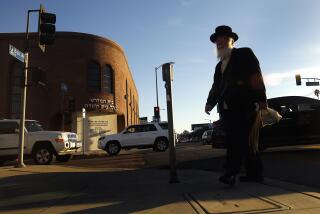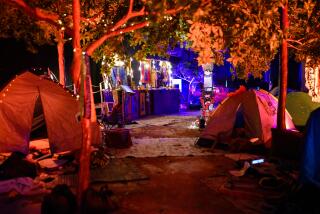Teens Cancel Out on Israel
- Share via
Amy Haber’s long-anticipated journey to Israel was planned to let her experience her Jewish heritage firsthand.
What she experienced instead was a difficult choice: giving up her trip or risking travel to an area plagued by violence.
Like thousands of Jewish teenagers, she pulled out.
“Everything’s been put off for now,” said Haber, 15, of Huntington Beach, who had signed up with a group that has since suspended its trip. She could have gone with another organization, but chose not to this year.
For decades, many Jewish teenagers have savored the rite of passage of a summer trip to Israel, where they learn informal lessons on Jewish history and heritage--standing on the exact spots where Biblical events are said to have unfolded--and sample the customs, sounds and tastes.
But the escalating violence in the Middle East has persuaded many Jewish youth organizations to cancel their trips, either because of low sign-ups or security concerns.
“We’re all devastated that we’re not sending our children,” said Joan Kaye, executive director of the Orange County Bureau of Jewish Education.
Only four families signed up to attend the bureau’s six-week program to Israel. A minimum of 25 are needed for the trip, and financial assistance is provided for the journey, which can cost up to $4,000.
“The Israel trip is a major step for youths in connecting with their Jewish identity,” Kaye said. “Going as a high school student is important, because it’s the first time the kids are learning to be on their own.”
Amy Haber had kept a list of souvenirs she would like to buy and had prepared for the trip by brushing up on her Hebrew.
She had even thought about the personal note she would leave on the Western Wall, Judaism’s holiest site. Now she has decided to spend her summer hosting an Israeli student and participating in a water polo league.
Organizations such as Young Judaea, which has sent more than 30,000 teenagers to Israel, have seen turnout plummet this year.
Only 16 youngsters have registered for the organization’s summer trip this year; it typically attracts up to 1,200 youths ages 15 to 18 each year.
“The worst attendance it’s ever been,” said Andrew Yolin, assistant director of Young Judaea, which has decided to go forward with its trips.
She said Jewish youths often “fall in love” with the country and Israeli society on the trips. They participate in daylong outdoor activities, including hiking, camping in the desert, archeological digs and boot camp training.
Some teens and their families think the eye-opening experience is worth the risk.
“For me, it’s more important to be in Israel right now more than ever because the rest of the world needs to see that Jews and Israelis aren’t going into hiding from the violence,” said Revital Shoaham, 18, of Irvine, who will go in August for a year through a Young Judaea program.
“Wanting to be in Israel so much outweighs the fear of violence. I’m sure once I get there, the reality of the situation will sink in and I’ll be scared,” she said.
“Those who live there and see the violence around them still go on with their daily lives. They just don’t put their lives on hold. And that’s how I see my trip. I just can’t put it on hold.”
Still, she plans to have her cell phone with her at all times so she and her mother can stay in contact.
Youth groups in the states work closely with Jewish security agencies in Israel to ensure that the young American travelers are not targets. Participants are not allowed to ride public buses and must be accompanied by armed medics at all times.
Summer months are a peak season for Americans to travel to Israel, said Dana Kempler, western regional director of public relations for the Israel Government Tourist Office.
Israel’s $3-billion tourism industry has taken a heavy hit because of the escalating violence in the Middle East and the Sept. 11 terrorist attacks in the United States, Kempler said.
During the last two years, as violence in the area has escalated, tourism has dropped by half, with an estimated 1.2 million Jews traveling from the U.S. to Israel in 2001.
Adults have been somewhat less likely to cancel than teens, according to the groups that set up tours in Israel.
“Parents tend to be much more conservative when weighing the risks for a child,” Kaye said after an eight-day trip to Israel with 40 adults.
“The problem is the random nature of the violence,” said Sharon Haber, Amy’s mother.
“If she goes, every report we’d hear of a bombing would just drive us crazy. Not knowing her level of safety at each moment, it’s just too difficult.”
More to Read
Sign up for Essential California
The most important California stories and recommendations in your inbox every morning.
You may occasionally receive promotional content from the Los Angeles Times.










